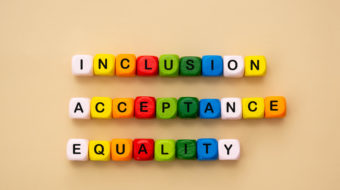4 Takeaways from the HRC’s New Future-Proofing Business Report
As society continues to grow and evolve, corporate leaders who want to secure their business’s future must take mindful, strategic steps to embrace and connect with the LGBT community and allies.
In January, the Human Rights Campaign Foundation (HRC) released Future-Proofing Business: Embracing Today and Tomorrow’s LGBTQ+ Workers and Customers—a report investigating the diversity and inclusion of LGBT workers and customers. Here are our top 4 takeaways.
1. Gen Z and Millenials are a majority of the LGBTQ community
7.1% of US adults self-identify as part of the LGBT community and Gen Z seems to be the main driver of that growth, with 21% identifying as lesbian, gay, bisexual, transgender, or similar. That means that 1 in every 5 adult members of Generation Z self-identify as LGBTQ.
It’s no surprise that people of Generation Z are the largest proportion of the LGBTQ community. Having grown up deeply integrated in the world of social media and being able to voice their own experiences and opinions so easily, Gen Zers tend to be more open-minded.
Not only are Gen Z and Millenials a majority of the LGBTQ community, but they are also more likely to have friends and family members in the community. So it makes sense that Gen Z and Millenials are deeply considered about the future of LGBTQ rights, even with the executive order recently signed by President Biden.
2. Workforce demographics are shifting (younger workforce)
As younger generations account for larger shares of the population, workforce demographics are also shifting.
This shift in demographics will define the future of the workplace because younger generations operate differently. Their upbringing, experiences, and values differ greatly from the generations before them.
Aside from things like remote working and integrating better work-life balance, a younger workforce will emphasize diversity and inclusion in the workplace. Today, the current workforce is more openly LGBTQ and pro-equality than ever before, and that’s only expected to grow over the coming years.
3. Workplace culture is dependent on inclusivity
With the workforce leaning on Generation Z and Millenials, the future is bright for the LGBTQ community.
It wasn’t until 1973 that homosexuality was no longer considered a mental disorder. Since then, there has been great progress toward creating a more inclusive workplace. But the fight isn’t over.
A 2022 study from GLAAD and Edelman Trust Institute of 2,000 Americans found that U.S. employees are 4.5 times more likely to want to work at a company if it publicly supports and demonstrates a commitment to expanding and protecting LGBTQ+ rights.
LGBTQ employees thrive in inclusive workplaces. They thrive in many ways mentally, personally, and professionally including:
- Greater job commitment
- Increased well-being at work
- Stronger relationships with teammates
- Improved mental health
Inclusive workplace environments benefit not only employees but the company’s bottom line as well. Businesses that promote inclusive workplace environments see:
- More successful recruitment
- Improved employee engagement and retention
- Increased sales
- Improved customer loyalty
- More positive business reputation
An inclusive workplace indeed benefits everyone.
4. Pride is 365 days a year, not just June.
Celebrating Pride is a great way to show your allyship with your employees and the community, but it shouldn’t be the only way you do it.
Workplace inclusion is 24/7, 365 days a year—it doesn’t start and end in June.
There are several ways businesses can support the LGBTQ community all year long. Here are a few options:
- Inclusive marketing: Leadership should regularly meet with marketing and communications departments to promote inclusive marketing year-round. Inclusive marketing considers diversity in all forms: age, ethnicity, socio-economic status, and gender identity.
- Be an equal-opportunity employer: If you haven’t already, commit to being an equal-opportunity employer. This means that as an employer, you prioritize employing people from diverse backgrounds, including LGBTQ people, and providing fair compensation.
- Be honest: No ally is perfect. We all make mistakes, it’s what makes us human, but owning up to those mistakes is equally as important. Admitting to your faults and making active steps to do better in the future is one of the best ways to support the LGBTQ community.
- Train your staff: Company-wide training sessions are critical to ensuring inclusion in the workplace and a positive culture. You want to create a workplace that employees want to come to every day and feel comfortable being themselves. Training sessions should focus on company values, pronouns, gender-neutral language, how to be an ally, how to report discrimination, and more.








